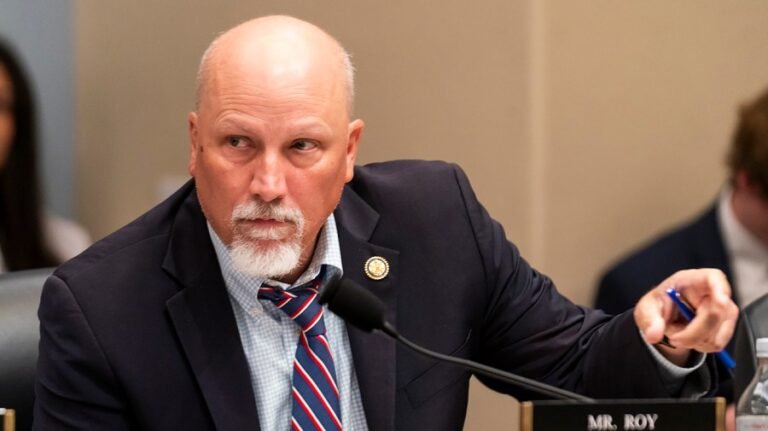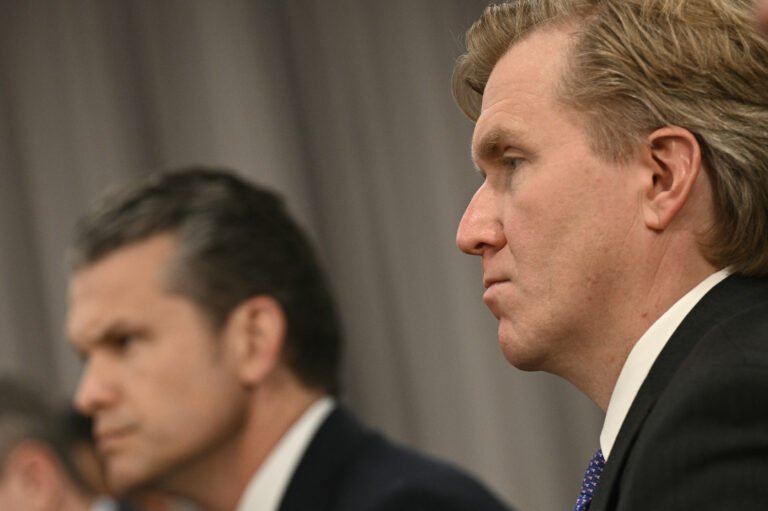
GOP leaders are scrambling to unite their conference behind the massive Senate bill that would enact President Trump’s domestic agenda and get it to the president’s desk before the holiday weekend.
They have their work cut out for them.
Not only are moderate Republicans balking at cuts to Medicaid, which were made larger by the Senate, but conservatives are also up in arms over the massive increase in deficit spending, also increased by the upper chamber. The combination is raising questions about whether GOP leaders can rally enough support to pass the bill, given a slim House majority that allows for only a small handful of defections.
“If you look at the totality of this, I don’t believe this delivers what the president, what the administration, were working to deliver on,” said Rep. Chip Roy (R-Texas), a vocal member of the conservative House Freedom Caucus, which is fighting to rein in deficit spending.
“I know why they’re going to lobby for it, I know why the president’s going to push for it. They want to see it get done, and I get it,” he continued. “But I think we have more work to do.”
The resistance poses a huge challenge for Speaker Mike Johnson (R-La.) and other GOP leaders, who are racing to bring the holdouts on board for the sake of enacting the core of Trump’s second-term agenda, including sweeping tax cuts, a crackdown on immigration, a shift away from green energy and huge cuts in federal health and nutrition programs.
Some of those House GOP critics — moderates and conservatives alike — had warned in no uncertain terms that they were ready to oppose the bill if it were made “worse” by the Senate. Now they face the dilemma of either abandoning that position, to give Trump a win, or standing by it to vote “no” — even if it means sinking the bill.
Centrists and hard-liners are now weighing those two forces, and some were quick to acknowledge the pickle they’re in.
“Maybe I’ll get lucky and have a rough enough landing or something that I’m unable to make [it] to D.C. for a few weeks,” one moderate House Republican told The Hill, underscoring the corner they find themselves in.
Hanging over their decision is the president himself, who is pressing hard on Republicans of all stripes to back the legislation — and might encourage primary challenges against recalcitrant lawmakers who oppose the “big, beautiful bill.”
That scenario is not just a hypothetical.
Rep. Thomas Massie (R-Ky.) — who voted against the House version of the legislation in May and is expected to oppose the Senate bill this week — has been the target of a MAGA-backed super PAC fighting to get someone more loyal to Trump into his seat. Across the Capitol, Sen. Thom Tillis (R-N.C.) also faced the president’s wrath after announcing he would oppose the package. A day later, Tillis announced that he will retire at the end of this term.
Democrats aren’t making it any easier. While they’re powerless to block the legislation, they’re highlighting the most controversial provisions of the package, which include steep cuts to low-income health and nutrition programs — money Republicans are using to help pay for their tax cuts. Democrats are already honing their attacks on battleground Republicans who might support the bill.
“Republicans claim to be the party of working-class Americans — you are not. You are hurting working-class Americans. This bill won’t make life more affordable for the American people. It will make life more expensive,” House Minority Leader Hakeem Jeffries (D-N.Y.) told reporters Tuesday in the Capitol. “Why would any so-called traditional Republican, particularly those who are in swing seats all across America, vote for a bill that will aggressively and actively hurt their constituents?”
Adding to the pressure, Johnson and GOP leadership are trying to pass the bill by their self-imposed July 4 deadline, which is Friday, a timeline that will require a herculean effort to meet.
In a statement right after the Senate vote, the top four House GOP leaders said they would finish their work “in time for Independence Day.” But later in the day, when talking to reporters in the hallway, Johnson was less sure.
“We’ll see what happens in the next 24 hours,” he said.
While coy on the timeline, he was clear that he was not thrilled with the Senate’s changes — but he suggested the House would not make changes of their own, which would require another vote in the Senate.
“I’m not happy with what the Senate did to our product, but we understand this is the process, it goes back and forth, and we’ll be working to get all of our members to ‘yes,’” the Speaker said. “So high stakes, aggressive schedule, and we knew it would come to this moment.”
Some lawmakers are skeptical they can get it done in time.
“The changes the Senate made to the House passed Beautiful Bill, including unacceptable increases to the national debt and the deficit, are going to make passage in the House difficult,” Rep. Marlin Stutzman (R-Ind.), a Freedom Caucus member, wrote on the social platform X. “I am willing to work through the 4th to make sure this bill is better for America’s children tomorrow by spending less today.”
The sprint, nonetheless, is already underway.
The House Rules Committee convened for a meeting about the bill Tuesday afternoon, marking the first step in the consideration process in the lower chamber. Once the panel adopts a procedural rule, House GOP leaders want to convene the chamber at 9 a.m. Wednesday to begin debating the rule, then hold a vote to adopt the procedural rule, followed by a vote on the underlying legislation.
But the first step is already on thin ice.
Rep. Andy Harris (R-Md.), the chair of the Freedom Caucus, said Tuesday on Fox News that he will vote against the procedural rule on Wednesday, warning that it will be stopped in its tracks — a reality that would bring legislative business to a halt.
Republicans can only lose three of their own and still advance the rule, assuming full attendance and united Democratic opposition. Two of those defectors are already claimed with Harris and Rep. Ralph Norman (R-S.C.).
“That’s exactly why a group of us are not going to vote to advance the bill until we iron out some of the deficit problems with the bills,” Harris said when asked about Elon Musk’s criticism of the bill. “Look, Mr. Musk is right, we cannot sustain these deficits; he understands finances, he understands debts and deficits, and we have to make further progress. And I believe the Freedom Caucus will take the lead in making that further progress.”
Trump weighed in on Tuesday afternoon, praising the Senate for passing his agenda and urging House Republicans to follow suit.
“I thought the Senate was going to be tougher than the House. We got there. We got pretty much what we wanted,” Trump said. “It’s the biggest bill ever passed if we get this done.”
A senior White House official was even more direct, all but demanding that the House pass the bill in its current form in time to grant Trump a symbolic signing on Independence Day. The official dismissed the idea that the House could make changes to the Senate bill and then have the chambers “conference” the two versions into one.
“The end of the road is here. The bill is finished. The bill needs to be sent to the president’s desk and it needs to be done … on or before July 4,” the official said. “I don’t think we view conference as a productive enterprise.”
The White House is whipping hard ahead of the vote, the official added, with a number of top officials working the phones, including Trump; his budget director, Russell Vought; and the heads of the Energy and Treasury departments.
Alex Gangitano contributed reporting.


